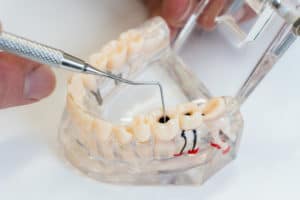To treat gum disease effectively, start with professional cleaning and good oral hygiene. If needed, antibiotics and scaling may be necessary. In severe cases, surgical intervention like flap surgery could be crucial for gum disease treatment. This comprehensive approach helps manage and prevent gum disease from advancing.
Gum Disease Treatment
Gum disease (periodontitis) treatment involves deep cleaning (scaling & root planing) by a periodontist to remove plaque and bacteria below the gumline. Early stages might not require surgery, but advanced cases may involve gum grafts, bone grafting, or tissue regeneration procedures.
Understanding Periodontal Disease
Understanding gum disease is crucial for maintaining optimal oral health and preventing serious complications.
Gum disease, also known as periodontal disease, is caused by bacteria in plaque. It leads to inflammation and infection of the gums. The initial stage of gum disease is gingivitis, which is characterised by red, swollen gums that may bleed during brushing or flossing. If left untreated, gingivitis can progress to periodontitis, a more severe form of gum disease that can cause irreversible damage to the gums and bone supporting the teeth.
Effective treatment for gum disease involves professional cleaning to remove plaque and tartar buildup and proper oral hygiene practices at home. These may include regular brushing, flossing, and using antiseptic mouthwash. In more advanced cases, additional treatments such as scaling and root planing, antibiotics, or surgical procedures may be necessary to combat the infection and restore gum health.
Importance of Early Detection
Early detection of gum disease plays a vital role in preventing its progression to more severe stages and minimising potential damage to oral health.
Gum disease, also known as periodontal disease, is a common condition that can lead to serious complications if left untreated. Recognising the symptoms of gum disease, such as bleeding gums, persistent bad breath, receding gums, and gum sensitivity, is crucial in identifying the issue early on.
Visiting a dentist regularly for check-ups can help in the early detection of gum disease and prompt treatment initiation.
Professional Dental Cleanings
Regular professional dental cleanings are essential for maintaining optimal oral health and preventing gum disease progression. During a dental cleaning, a dental hygienist or dentist will remove plaque and tartar buildup that cannot be effectively addressed through regular brushing and flossing.
This thorough cleaning not only helps treat existing gum disease but also plays a crucial role in preventing its onset. By removing plaque and tartar, professional cleanings help reduce the risk of inflammation and infection in the gums, promoting overall oral hygiene.
Professional dental cleanings remove plaque and tartar and allow the dentist to examine the overall health of your mouth. This examination can help detect potential issues early, allowing for timely care and treatment.
Regular professional dental cleanings are a cornerstone of preventive dental care and are instrumental in maintaining healthy gums and teeth. Schedule your routine cleanings as advised by your dentist to ensure optimal oral health and prevent gum disease.
Antibiotic Therapy Options
Antibiotic therapy is a valuable adjunct in the treatment of gum disease, particularly in cases where conventional methods may not suffice.
Antibiotics play a crucial role in combating periodontal disease by targeting the oral bacteria responsible for gum infections. These antimicrobial agents can be administered through various options, including oral tablets, mouth rinses, or direct application to the gingival tissue.
When integrated into a comprehensive periodontal treatment plan, antibiotics can effectively reduce the bacterial load in the periodontal pockets and inhibit further progression of the disease. This adjunct therapy is especially beneficial for individuals with advanced gum infections or those who have not responded adequately to initial interventions.
It is essential to consult a dental professional to determine the most suitable antibiotic therapy based on the patient’s specific needs. Proper antibiotic use, in conjunction with regular professional cleanings and good oral health care practices, can significantly improve the outcomes of gum disease treatment and promote overall oral health.
Scaling and Root Planing
An essential procedure in treating gum disease involves scaling and root planing, which effectively remove plaque and calculus buildup from below the gumline. Gum disease, also known as periodontal disease, is caused by bacteria in plaque, which leads to inflammation, which can ultimately affect oral health.
During scaling, the dentist uses special tools to remove plaque and tartar from the teeth and roots. Root planing involves smoothing out the root surfaces to help the gums reattach to the teeth.
This deep cleaning procedure is crucial in preventing the progression of gum disease and promoting overall oral health. By removing the buildup of plaque and tartar, scaling and root planing can help reduce inflammation and prevent further damage to the gums and bones supporting the teeth. Dentists recommend this treatment for patients with gum disease to improve oral health and prevent tooth loss.
Regular dental visits and proper oral hygiene at home are essential in maintaining the results of scaling and root planing and preventing gum disease from recurring.
Laser Therapy for Gum Disease
Laser therapy is a modern approach to treating gum disease that uses advanced technology to offer precise and minimally invasive solutions for targeting bacteria and promoting gum health. This innovative dental treatment, performed by a trained dentist, uses a focused beam of light to remove inflamed gum tissue affected by gum disease.
The laser effectively kills bacteria and removes diseased tissue while promoting healthy tissue regeneration. Patients undergoing laser therapy for gum disease often experience less discomfort and a quicker recovery time compared to traditional surgical methods.
One of the key benefits of laser therapy is its ability to selectively target damaged areas without affecting surrounding healthy tissue. This precision helps in reducing the risk of complications and allows for a more controlled treatment process.
Additionally, laser therapy can aid in reducing common symptoms of gum disease, such as swollen and red gums. As part of advanced dental care, laser therapy represents a promising treatment option for individuals seeking effective and minimally invasive solutions for gum disease.
Surgical Treatments for Severe Cases
In cases of severe gum disease that have not responded to non-surgical treatments, surgical interventions may be necessary to address the condition effectively.
When gum disease reaches a severe stage, it can lead to various complications such as damage to the tooth root, loose teeth, and jeopardize overall dental health. In such instances, surgery may be recommended by a dentist to prevent further progression of the disease and restore oral health.
Surgical treatments for severe gum disease aim to eliminate deep pockets that have formed between the gums and teeth, remove tartar deposits below the gum line, and address any damage to the tooth root that may have occurred.
Flap surgery, bone or tissue grafts, and guided tissue regeneration are common in treating severe cases. These treatments may help regenerate lost bone or tissue, stabilise loose teeth, and improve overall oral care.
It is important to consult with a dentist if you suspect severe gum disease, as early intervention can prevent irreversible damage and maintain good dental health.
Final Thoughts on Treating Periodontal Diseases
Treating gum disease is crucial for maintaining oral health.
While some may hesitate to seek treatment due to fear or discomfort, it is important to remember that early detection and intervention can prevent more severe consequences in the future.
By taking proactive steps to address gum disease, individuals can protect their overall well-being and preserve their oral health for years.
As you prioritise your oral health, remember that addressing gum disease is crucial to maintaining a healthy smile. Early detection and treatment can prevent further complications down the road. Don’t wait until it’s too late – take action today to protect your overall well-being. For professional care and expert guidance on gum disease treatment, visit the best dentists at Aspendale Gardens Dental Care in Aspendale Gardens, VIC. Your oral health is worth the investment.











